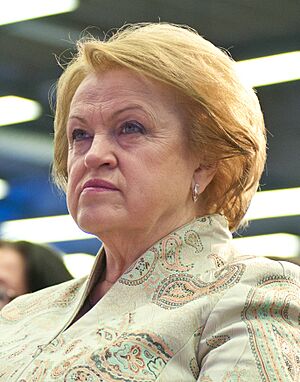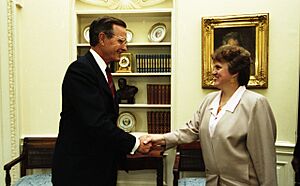Kazimira Prunskienė facts for kids
Quick facts for kids
Kazimira Prunskienė
|
|
|---|---|

Prunskienė in 2011
|
|
| Minister of Agriculture | |
| In office 14 December 2004 – 9 December 2008 |
|
| Prime Minister | Gediminas Kirkilas |
| Preceded by | Jeronimas Kraujelis |
| Succeeded by | Kazimieras Starkevičius |
| Member of the Seimas | |
| In office 26 November 1996 – 17 November 2008 |
|
| Preceded by | Everistas Raišuotis |
| Succeeded by | Valentinas Stundys |
| Constituency | Molėtai–Švenčionys |
| 1st Prime Minister of Lithuania | |
| In office 17 March 1990 – 10 January 1991 |
|
| Preceded by | Position re-established |
| Succeeded by | Albertas Šimėnas |
| Personal details | |
| Born | 26 February 1943 Vasiuliškė, Ostland (now Lithuania) |
| Political party | Communist Party (1980–1990) New Democracy - Women Party (1995–2001) Popular Peasants Union (2001–2009) People's Party (2009–present) |
| Other political affiliations |
Sąjūdis (1988–1990) |
| Alma mater | Vilnius University |
| Signature |  |
Kazimira Danutė Prunskienė (; born 26 February 1943) is a Lithuanian politician. She made history as the first prime minister of Lithuania after the country declared its independence on 11 March 1990. Later, she served as the Minister of Agriculture.
She was also a leader of different political groups, like the Peasants and New Democratic Party Union. She also led the Lithuanian People's Party. From 1981 to 1986, she worked in West Germany.
In 2004, she ran for president in Lithuania. She came in second place in the first round of voting. She was not elected in the final round.
Prunskienė is a member of the Council of Women World Leaders. This group connects women who are or were presidents and prime ministers. Their goal is to work together on important issues for women and fair development worldwide.
Contents
Early Life and Education
Kazimira Danutė Stankevičiūtė was born on 26 February 1943. Her birthplace was the village of Vasiuliškė, in what is now Lithuania. Her father, Pranas Stankevičius, was a forest ranger. He was also a joyful musician.
Her father played many instruments, like the guitar and fiddle. He was killed when Kazimira was only one year old.
Prunskienė went to Vilnius University. She earned her first degree in economics in 1965. Later, in the 1980s, she earned a higher degree called a doctorate from the same university. After her studies, she worked at the university as a teacher and researcher.
She married Povilas Prunskus before finishing her first degree. They had three children: a son named Vaidotas and two daughters, Rasa and Daivita. She later divorced her first husband. In 1989, she married Algimantas Tarvidas.
Political Career and Leadership

Prunskienė moved from working at the university to working in government. In 1980, she joined the Lithuanian Communist Party. By 1986, she became a deputy director at an agricultural research institute.
In 1988, Prunskienė helped start a group called Sąjūdis. This group grew into Lithuania's main movement for independence. In the late 1980s, she became a Deputy Chairwoman in the Lithuanian government.
On 17 March 1990, she was chosen as the Prime Minister. This made her the first woman to hold this position in Lithuania. She was also the first Prime Minister after Lithuania declared independence on 11 March 1990.
She quickly faced big challenges. The Soviet Union tried to stop Lithuania's independence. They put an economic embargo on Lithuania. This meant they stopped trade to try and force Lithuania back under their control.
Prunskienė traveled to many countries, including the United States. She sought support for talks with Mikhail Gorbachev, the leader of the Soviet Union. She wanted to end the embargo. After nine months, she resigned as Prime Minister. Later, she led the Department of Agriculture in Lithuania.
In 1994, Prunskienė left the Democratic Labour Party of Lithuania. The next year, she became the leader of the Lithuanian Women Party. She also led the Peasants and New Democracy Union. She left that group in 2009. Soon after, she started the Lithuanian People's Party.
In 2012, Prunskienė had a stroke. Her health has not been good since then. She has not been active in politics or public life since that time.
Writings and Contributions
Kazimira Prunskienė has also shared her ideas through writing. At a conference in Vienna, Austria, in 1997, she published an article. It was titled The Role Of Women In Democracy: The Experience Of Lithuania.
In her writing, she talked about important issues. She discussed how women often earn less money than men. She also wrote about the traditional views in her Catholic country. She explored the general status of women and their influence in Lithuanian politics.
See also
 In Spanish: Kazimira Prunskienė para niños
In Spanish: Kazimira Prunskienė para niños
 | May Edward Chinn |
 | Rebecca Cole |
 | Alexa Canady |
 | Dorothy Lavinia Brown |

